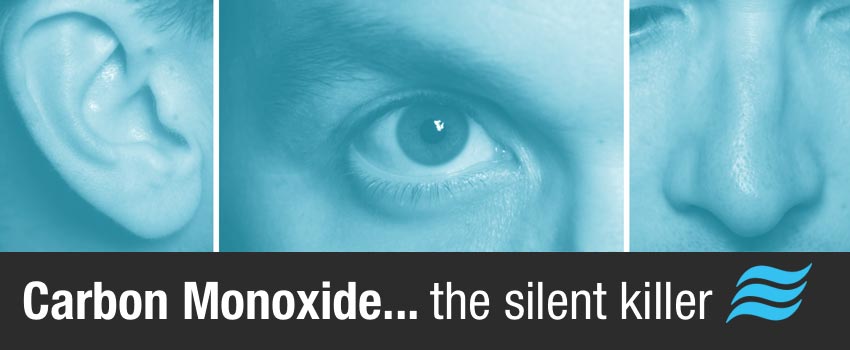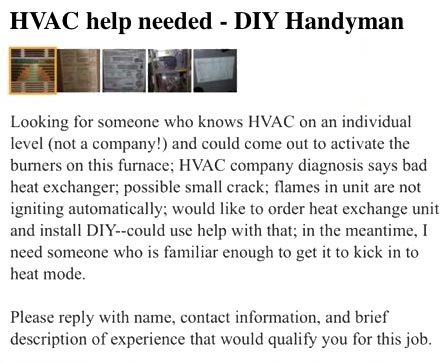
Gas-Fired Heating Equipment, CO Poisoning, and Why Maintenance Matters
Due to their efficiency gas-fired heating equipment are still very popular, electric appliances are often cheaper on the front end but are more expensive to run.
Two things all gas-fired heating equipment has in common: a heat exchanger and a flue. Some are negative pressure, some are static, some are gravity fed, but one thing that is ALWAYS true is the risk you take when you do not properly maintain the equipment. Gas-powered equipment is typically cheaper to operate than electric, and is safe when installed with proper venting and is maintained regularly. But when neglected, there is a risk of carbon monoxide poisoning in people and pets living in the home. We want you to be aware of the dangers so you can keep your family safe.
Heating appliances that can or do run on gas, oil or propane:
- Home heating
What should you know about CO in your home?
The most important thing to understand about CO (Carbon Monoxide) is that it is referred to as the “silent killer” because CO is an odorless, colorless, and undetectable gas. Carbon Monoxide at low levels causes mild health effects often mistaken for the flu. At high doses of CO exposure can be fatal in humans and pets.
If you have gas-powered appliances in your home, it is imperative that you have a Carbon Monoxide detector(s) installed to alert you to the possibility of danger, however – routine maintenance on your gas appliances can help ensure that your detector never goes off. Both are necessary, CO detector(s) and a proactive maintenance plan.
What are the signs of CO Poisoning?
- Dull headache
- Weakness or Fatigue
- Dizziness
- Nausea/Vomiting
- Disorientation or Confusion
- Shortness of breath
- Blurred vision
- Loss of consciousness
“Is my home at risk of a gas leak?”
Some homes have no gas appliances – in fact, some have no gas line running to them at all. However, many homes operate gas-powered water heaters, boilers, or oil furnaces. While these systems vary by their type of motor or method of exhaust, the common thread is that they cannot be ignored. Without professional maintenance, your equipment can have a rusted flue pipe, a cracked heat exchanger, or a faulty inducer – issues that can lead not only to breakdowns, expensive repairs but also to the risk of toxic CO emissions.
Proactive care is necessary with gas-powered equipment to reap the efficiency benefits and avoid the dangers.
Many Northern Virginia HVAC companies do their best to avoid working on oil and gas-fired heating equipment. Nichols and Phipps specialize in working on (list equipment here). Give us a call to get your equipment inspected.
We don’t want you to fear gas powered heating equipment. They have many efficiency benefits and often outlast their electric counterparts.
How will HVAC system maintenance help prevent CO Poisoning?
Our technicians are trained to install and repair all makes, models and types of heating equipment. Part of that training is to know what obvious issues to look for but more importantly, what subtle clues to look for that are evidence of a bigger problem. Catching problems early, while the issue and the price tag is small, is why proactive maintenance is important. It is why you (hopefully) go to the dentist annually and go for health & wellness checkups with your doctor. Not that you are sick, but to catch issues in their infancy.
The mindset, “If it ain’t broke, don’t fix it”, is risky.
As a homeowner, you only have evidence of an issue at the full breakdown point. Yes, we are in the business of fixing broken HVAC equipment. And yes, repair and equipment replacement is great for the bottom line, but morally and ethically we stand behind proactive care. We want your equipment to last you as long as possible. We want to catch problems while they are still under warranty or when the issue and the price tag is small. We want your family cozy in winter and cool in the summer and for your comfort systems to just work. If it is broke, we’ll fix it. If it can’t or shouldn’t be fixed, we’ll replace it. If it is working, we want to keep it that way. The most important thing, way above saving you hassle and money is that those of you with gas-powered appliances understand how vital professional maintenance is in keeping your family safe.
So, what happens if I have a CO leak?
In the event that your system demonstrates a CO leak – or risk of one – we will immediately call for a red tag shutdown to keep ourselves and especially your family and pets safe from the risk of further CO exposure or risk of fire. We then work with you to develop a plan of repair. It is important to understand there is no quick fix for these issues. Never believe a technician who tells you there is. At Nichols and Phipps we live by honest, upfront communication at all times.
What not to do if you have a cracked heat exchanger
There are no quick fixes or technical band-aids that can be applied when it comes to a heat exchanger. Period.
This is a craigslist ad that was shared in an HVAC forum we frequent and it made us cringe. His heat exchanger was condemned and he wanted to hire a handyman to “kick into heat mode”, going against professional advice, while he dealt with the purchase and DIY installation of a new heat exchanger.
- Never use a gas-fired heating equipment after it has been condemned
- If you don’t trust you’ve been given a correct diagnosis… get a second opinion from another professional
- Many many things around the home are 100% DIY projects if you are willing to take the time to figure it out. Dismantling the old and installing a new heat exchanger is not one of them
- If you are unsure, give us a call, we are happy to help you figure out a plan of action, whether that is deciding if it is a DIY project or hiring us to take care of the problem. We are just a phone call away.

Our Advice
- Have your equipment inspected and proactively maintained
- Don’t do DIY work on gas-powered appliances – many licensed HVAC companies in our area avoid working on them, and they have training. Call us, we love working on boilers, furnaces and heat pumps.
- Install CO detector(s) near vents (ceiling or high on the wall) and within 5 ft of the gas-powered appliance. We sell and install professional grade detectors.
- While you are thinking about it, check your fire alarm batteries and see if it is time to update your fire extinguishers (yes they expire).
Call our office at (703) 670-8519 to set up a one-time inspection of your system(s) or sign up for our Comfort Club Membership that includes twice-yearly maintenance on your heating and cooling system, plus many other bonus discounts. Our plumbing department also has maintenance programs for your water heater. Electric or gas, all water heaters need regular maintenance, our plumbing department will take care of you.
Check out our other blogs for some great HVAC advice:
- Monthly Guide To HVAC Maintenance
- The 5 Biggest HVAC Myths
- How to Get Your AC Read For Summer After A Long Winter
- Pet Owners! Get More Life Out Of Your HVAC Unit With These 6 Tips
- Gas Leaks and How to Prevent Them
- How to Remove Humidity From Your Home
- Signs of a Damaged Furnace Heater
- 5 Biggest HVAC Myths
- 5 Tips For Spring Cleaning Your HVAC System
